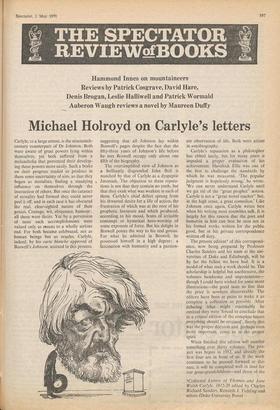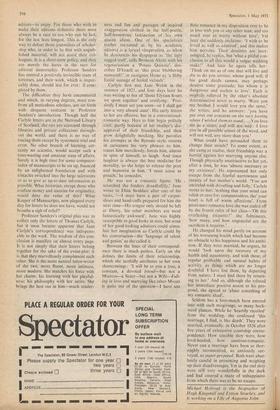414 , REVIEW:430MS
Hammond Innes on mountaineers Reviews by Patrick Cosgrave, David Hare, Denis Brogan, Leslie Halliwell and Patrick Wormald Auberon Waugh reviews a novel by Maureen Duffy
Michael Holroyd on Carlyle's letters
Carlyle, to a large extent, is the nineteenth- century counterpart of Dr Johnson. Both were aware of great powers lying within themselves, yet both suffered from a melancholia that prevented their develop- ing these powers more easily. Such a brake on their progress tended to produce in them some uncertainty of aim, so that they began as moralists, finding a steadying influence on themselves through the instruction of others. But once the cataract of morality had formed they could never peel it off, and in each case it has obscured the real, clear-sighted nature of their genius. Courage, wit, eloquence, humour: all these were theirs. Yet by a perversion of taste such accomplishments were valued only as means to a wholly serious end. For both became celebrated, not as human beings but as oracles. Carlyle, indeed, by his carte blanche approval of Boswell's Johnson, assisted in this process, suggesting that all Johnson lay within Boswell's pages despite the fact that the fifty-three years of Johnson's life before he met Boswell occupy only about one fifth of the biography.
The oversimplified view of Johnson as a brilliantly disgruntled John Bull is matched by that of Carlyle as a dyspeptic Jeremiah. The objection to these reputa- tions is not that they contain no truth, but that they exalt what was weakest in each of them. Carlyle's chief defect sprang from his thwarted desire for a life of action, the frustration of which was at the root of his prophetic literature and which produced, according to his mood, bouts of irritable contempt or hysterical hero-worship of some exponent of force. But his delight in Boswell points the way to his real genius. For what he admired in Boswell, he possessed himself in a high degree: a fascination with humanity and a passion- ate observation of life. Both were artists in autobiography.
Carlyle's reputation as a philosopher has ebbed lately, but for many years it impeded a proper evaluation of his achievement. Havelock Ellis was one of the first to challenge the standards by which he was measured. 'The popular judgment is hopelessly wrong,' he wrote. 'We can never understand Carlyle until we get rid of the "great prophet" notion. Carlyle is not a "great moral teacher" but, in the high sense, a great comedian.' Like Johnson once again, Carlyle writes best when his writing most resembles talk. It is largely for this reason that the poet and humorist in him can best be seen not in his formal works written for the public good, but in his private correspondence written off duty.
The present edition* of this correspond- ence, now being prepared by Professor Charles Sanders and his team at the uni- versities of Duke and Edinburgh, will be by far the fullest we have had. It is a model of what such a work should be. The scholarship is helpful but unobtrusive, the volumes handsome and unpretentious— though I could have wished for some more illustrations—the good taste so fine that the price is nowhere discoverable. The editors have been at pains to make it as complete a collection as possible. After debating what might reasonably be omitted they were 'forced to conclude that in a critical edition of the complete letters everything should be retained'. Surely this was the proper decision and, perhaps even more important, come to in the proper spirit.
When finished this edition will number something over thirty volumes. The pro- ject was begun in 1952, and already the first four are in front of us. If the work continues to be pressed forward at this rate, it will be completed well in time for our great-grandchildren—and those of the *Collected Letters of Thomas and Jane Welsh Carlyle, 1812-28 edited by Charles Richard Sanders. Kenneth J. Fielding and others (Duke University Press) editors—to enjoy. For those who wish to make their editions definitive there must always be a race to see who can be last, for the last lasts longest. This is the only way to defeat those. journalists of scholar- ship who, in order to be first with unpub- lished material, will not assist their col- leagues. It is a short-term policy, and they are merely the hares in the race for cditoral immortality. Professor Sanders has entered a positively invincible team of tortoises, and their work, which is impec- cably done, should last for ever : if coin- pleted by them.
The difficulties they have encountered and which, in varying degrees, must con- front all meticulous scholars, are set forth with eloquent restraint in Professor Sanders's introduction. Though half the Carlyle letters are in the National Library of Scotland, the rest are scattered through libraries and private collections through- out the world, and there is no way of tracing them except by systematic trial and error. No other branch of learning, cer- tainly no scientist, would accept such a time-wasting and amateur state of affairs. Surely it is high time for some computer- index of manuscripts to be set up, financed by an enlightened foundation and with tentacles switched into the large salerooms so as to give as up-to-date information as possible. What historian, except those who confuse money and stamina for originality, would deny the value of this? What Keeper of Manuscripts, now plagued every day for letters he does not have, would not breathe a sigh of relief?
Professor Sanders's original plan was to collect only the letters of Thomas Carlyle, but it soon became apparent that Jane Carlyle's correspondence was indispens7 able to the work. The wisdom of this con- 'elusion is manifest on almost every. page. It is not simply that their letters belong together for the sake of the event-plot; it is that they marvellously complement each other. She is the more natural letter-writer of the two, more fluent, more intimate, more modern. She matches his force with her charm; his learning with her playful- ness; his philosophy with her satire. She brings the best out in him—much tender- ness and fun and passages of inspired exaggeration clothed in the half-poetic, half-humorous fascination of his own quaint idiom. One • of his specialities (rather tut-tutted at by his academic editors) is a lyrical vituperation, as when he denounces his dyspepsia as 'the ugly ragged trull', calls Bronson Alcott with his vegetarianism a 'Potato Quixote', des- cribes D'Israeli as 'this great blubbering numscull I' or castigates Heine as 'a filthy foetid sausage of boiled victuals'.
Carlyle first met Jane Welsh in the summer of 1821, and four days later he was writing to her of 'those Elysian hours we spent together' and testifying: 'Posi- tively I must see you soon—or 1 shall get into a very absurd state'. His early letters to her are effusive, but in a conventional- romantic way. Hers to him begin politely cool, partly because of her mother's dis- approval of their friendship, and then grow delightfully mocking. She parodies his attempts at the Byronic style, returns in caricature his very phrases to him, teases him mercilessly, forces him, almost in spite of himself, to laugh. And since laughter is always the best medicine for morality, so she helps to release the poet and humorist in him. 'I must cease to preach; he concedes.
He was not a romantic figure. 'He scratched the fenders dreadful[l]y,' Jane wrote to Eliza Stoddart after one of his visits, `--1 must have a pair of carpet- shoes and hand-cuffs prepared for him the next time—His tongue only should be left at liberty, his other members are most fantastically awkward'. Jane was highly susceptible to good looks in men, but none of her good-looking admirers could stimu- late her imagination as Carlyle could by his conversation—the 'language of talent and genius' as she called it.
Between the lines of their correspond- ence there is much pathos. Early on she. defines the limits of their relationship, which she tactfully attributes to her own shortcomings: 'I will be to you a true, a constant, a devoted friend—but not a Mistress—a Sister—but not a Wife—Fall- ing in love and marrying like other Misses is quite out of the question-1 have too little romance in my disposition ever to be in love with you or any other man; and too much ever to marry without love'. Yet later she suddenly exclaims: '1 wish to be loved as well as admired', and this makes him nervous. Their destinies are inter- mingled, he replies, but 'what a pitiful con- clusion to all this would a vulgar wedding make!' And later he again tells her: 'Think on me as of one that will live and die to do you service; whose good will, if his good deeds cannot, may perhaps deserve some gratitude; but whom it is dangerous and useless to love'. Each is mightily relieved by the other's absolute determination never to marry. 'Were you my brother 1 would love you the same,' she writes; and he answers: 'you have put over our concerns on the very footing where / wished them to stand ... You love me as a sister, and will not wed: I love you in all possible senses of the word, and will not wed, any niore than you.'
What could have persuaded them to change their minds? To some extent, as she camejto realise, their friendship was a barridr 'against' her marrying anyone else. Though physically unattractive to her yet, after a time„ he was 'almost necessary to my existence'. He represented her only escape from the fearful narrowness and inanity of her mother's world. 'You are encircled with drivelling and folly,' Carlyle wrote to her; 'nothing that your mind can relish or care for; companionless, tho' your heart is full of warm affections'. From passionate romantic love she was sealed off by the frozen rules of her class—'Oh this everlasting etiquette !' she fulminates, 'how many, and how ungrateful are the sacrifices it requires.'
He changed his mind partly on account of his worsening health which had become an obstacle to his happiness and his ambi- tion. If they were married, he argues, he would 'look upon the recovery of my health and equanimity, and with these, of regular profitable and natural habits of activity, as things which are no longer doubtful. I have lost them, by departing from nature; I must lied them by return- ing to her.' And so, although she refused her immediate positive assent to his pro- posal, she agreed to 'abate something of my romantic ideal'.
Seldom has a love-match been entered into with such misgivings, so many back- ward glances. While he 'heartily recoiled' from the wedding, she confessed 'this marriage, I find, is like death'. They were married, eventually, in October 1826 after five years of exhaustive courtship corres- pondence. How sensible they were, how level-headed, how cautious-romantic. Never can a marriage have been so thor- oughly reconnoitred, so anxiously sur- veyed, so paper-prepared. Both were abso- lutely candid in presenting and weighing up their disadvantages. Yet in the end they were still very wonderfully in the dark and had entered a maze of unhappiness from which there was to be no escape.
Michael Holroyd is the biographer of llugh Kingsmill and Lytton Strachey. and is working on a life of Augustus John



































 Previous page
Previous page